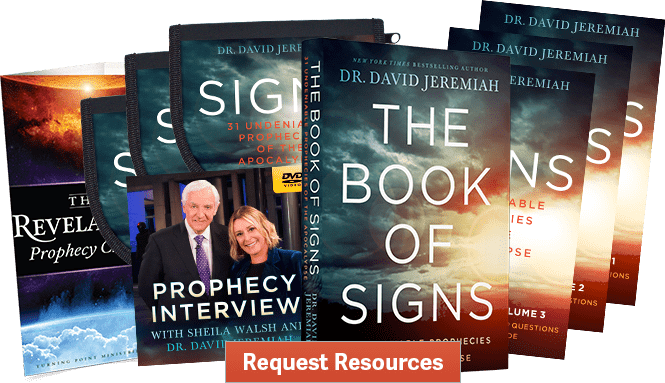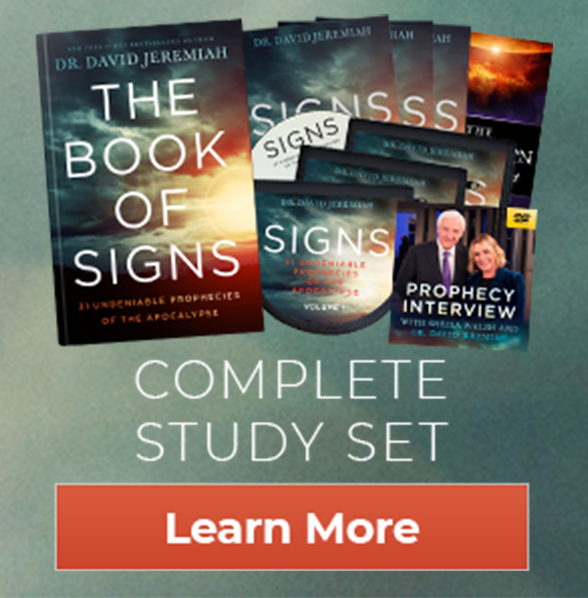

Dr. David Jeremiah Presents
Living inthe Ageof Signs
Online Destination

Living in the Age of Signs
Online Destination
How to Guard Against the Spirit of Babylon—Wisdom for Investing Your Resources in Today's World
As we've studied the prophetic sign of Babylon together, we've learned that it will be the center of the Antichrist's one–world economy. The Antichrist will begin his work under the guise of peace, but Babylon will quickly return to its former wickedness—extreme decadence, infinite cruelty, and ravenous power—total rebellion against God.
For those of us who are believers, we won't experience Babylon's rebirth during the Tribulation. But the spirit of Babylon is evident in our world today. Materialism and selfish pursuits dominate our culture.
As believers, how do we guard against the spirit of Babylon in our own lives? How do we wisely steward the wealth God has apportioned to us in our world today?
The Bible doesn't tell us how to invest our money, but it does provide principles for how we should steward our resources.
Recognize Today's Economy is Fragile and Fluctuating
When Enos Barton boarded a train for Cleveland in 1869, he was fuming about Western Union's decision to cut his salary by ten dollars per month. He had been one of the best telegraph operators in New York City during the Civil War. Every day he had accurately transmitted news to and from the front lines. But after the war, the economy faltered and Western Union cut costs. Barton quit and traveled to Ohio, hoping to find a job with inventor Elisha Gray.
Barton was a bright young man with a receding hairline, a retiring chin, sharp eyes, and a head for business. He was immediately impressed with Gray's product line—bells and alarms and new–fangled electrical gadgets. Barton decided he didn't just want to work for Gray; he wanted to co–own the business. There was only one problem. Barton didn't have any money to invest.
Sitting down with his mother, Barton shared his ideas and told her it was a great investment opportunity. She was impressed enough to mortgage the family farm and give him the $400 he needed to buy into the business, which became Gray and Barton (and later, Graybar). It was one of the best investments in history. Mrs. Barton's $400 investment has become a $5.4 billion FORTUNE 500 company and a leader in the telecommunications world.
It's amazing what you can do with $400—if you're the mother of a bright young man with a head for business and a knack for being at the right place at the right time. Unfortunately, few investments pay off like that. Millions of us have suffered loss during the last few years as the stock market has risen and plunged like a rollercoaster. Individual investors, senior citizens with mutual funds, charitable institutions with endowments, and most people who have a pension plan—have all suffered from the fragile and fluctuating world economy.
Not even the experts know what to do. "One of the funny things about the stock market," said the American publisher William Feather, "is that every time one person buys, another person sells, and both think they are astute."1
Discern How You Can Invest in Eternity
The Bible tells us to handle our money as wisely as we can. It is God who gives us the ability to earn a living and gain wealth (Deuteronomy 8:17–18). In Matthew 25:14–30, Jesus commended the wise stewards who made good investments of what had been entrusted to them. Proverbs 13:11 (NIV) says, "He who gathers money little by little makes it grow." That's why John Wesley famously said, "Make all you can, save all you can, give all you can."
But the Bible's fundamental investment strategy has little to do with accumulating money. Jesus Christ wasn't a stockbroker, but He gave the best investment tip in history when He said: "Do not lay up for yourselves treasures on earth, where moth and rust destroy and where thieves break in and steal; but lay up for yourselves treasures in heaven, where neither moth nor rust destroys and where thieves do not break in and steal. For where your treasure is, there your heart will be also" (Matthew 6:19–21).
The world is full of investment advisors, but none of them has a better plan. We have entire cable channels, like CNBC, Fox Business Network, and Bloomberg Television. We have talking heads like Jim Cramer and his ilk–hawking investment advice day and night. The Wall Street Journal has the largest circulation of any newspaper in the United States. Dozens of magazines are devoted to investment strategy and money management.
But Jesus perfectly understood the law of returns when He said in John 6:27, "Do not labor for the food which perishes, but for the food which endures to everlasting life." Colossians 3:2 says, "Set your mind on things above, not on things on the earth." The apostle Paul warned us not to put our hope in wealth, which is so uncertain, but to be rich in good works, thus laying up a treasure for ourselves as a firm foundation for the coming age (1 Timothy 6:19). We need to take stock of our lives and make sure we're investing ourselves in eternity. As Colonel Harlan Sanders put it, "There's no reason to be the richest man in the cemetery. You can't do any business from there."
With the world nearing an economic Armageddon, it's hard to imagine a safe place to deposit our money. But when we faithfully tithe or devote our resources to the Kingdom, it propels the Gospel to the world: souls are saved and heaven is populated. When you support your local church, your funds are transmuted into literature, lives, ministries, and missions. You may never see the returns until you get to heaven, but what a joy it will be to meet people who are there because your gift helped bring them to faith in Christ.
Invest Your Time as Wisely as Your Money
Our investments for Christ go beyond money. We also invest our energy and passion into the work, and this investment comes back to bless us. In his treatise on Christian zeal, the British writer J. C. Ryle wrote, "Zeal is good for a Christian's own soul. We all know that exercise is good for the health and that regular employment of our muscles and limbs promotes our bodily comfort and increases our bodily vigor. Now that which exercise does for our bodies, zeal will do for our souls. It will help mightily to promote inward feelings of joy, peace, comfort, and happiness. None have so much enjoyment of Christ as those who are ever zealous for His glory."2
Charles Caleb Colton was another British wit who is remembered for his quips and quotes. He knew how to turn a great phrase, and for many years his sayings have been recycled in quotation books. Colton, for example, is the one who first said, "Imitation is the sincerest form of flattery."
It is Colton's definition of time that interests me: "Time is the most indefinable, yet paradoxical of things; the past is gone, the future is not come, and the present becomes the past, even while we attempt to define it, and like the flash of the lightning, at once exists and expires." Time, according to another of Colton's apt quotations, is "the bleak and narrow isthmus between two eternities."
Right now we have just enough time to do what God wants us to do. According to Ephesians 2:10, "We are His workmanship, created in Christ Jesus for good works, which God prepared beforehand that we should walk in them." Ephesians 5:15–16 (ESV) adds, "Look carefully then how you walk, not as unwise but as wise, making the best use of the time, because the days are evil."
It is easy to become so busy doing what comes next that we only tackle those things that seem urgent. But the Bible tells us to give thought to our steps (Proverbs 14:8 NIV). We should begin every day by thinking through our agenda and making time for what is truly important, things that will matter in eternity.
In the April 3, 1919, edition of The Herald of Gospel Liberty, a Maine pastor named M. W. Willard told the story of a businessman in Calcutta who was approached by the secretary of the British Missionary Society for a donation. The merchant wrote a check for $250, a significant amount in those days. As he handed over the check, a cablegram arrived. He read it and looked troubled. "This cablegram," he said, "tells me that one of my ships has been wrecked and the cargo lost. It makes a very large difference in my affairs. I will have to write you another check."
The secretary understood perfectly and handed back the $250 check. The checkbook was still open, and so the merchant wrote another check and handed it over. It was for $1000.
"Haven't you made a mistake?" asked the secretary.
"No," said the merchant. "I have not made a mistake. That cablegram was a message from my Father in heaven. It read: ‘Lay not up for yourself treasure on earth.'"
The Bible says, "Do not love the world or the things in the world… the world is passing away, and the lust of it; but he who does the will of God abides forever" (1 John 2:15–17). The investments of this world may crumble, but whatever we invest in the kingdom, we're sending it on ahead. We will lose what we have in this life; but the time, energy, and resources we invest in God's work are solid investments that will pay dividends throughout eternity. This perspective will guard our hearts against the spirit of Babylon.
1Charles J. Corrado and Bradford D. Jordan , Fundamentals of Investments by (Boston: McGraw–Hill, 2004), 214.
2J. C. Ryle, Be Zealous (Ipswich: Hung & Son, 1852), 19.




